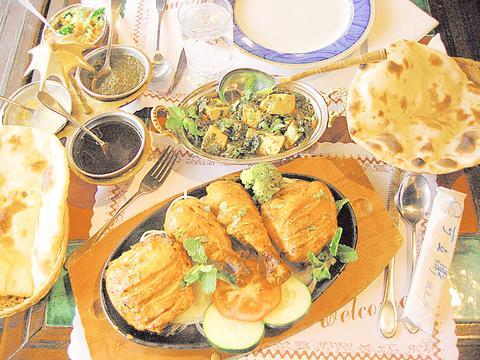For the past decade, Karachi native, Muhammad Ali, has been cooking up a storm with his authentic, flavorsome and at times tongue numbing Pakistani and Indian fare.
Originally located amid the chaos of the bustling Ninghsia Rd., (寧夏路) and its ever-busy night market, but for the last three years Ali has been operating out of the second floor of a commercial building on Nanjing East Road (南京東路).

PHOTO: GAVIN PHIPPS, TAIPEI TIMES
Vegetarian and non-vegetarian dishes such as sizzling spice-infused tandoori chicken (NT$280 to NT$550), nut-loaded and creamy masalas (NT$200 to NT$280), yogurt-based makhanwallas (NT220 to NT$340) and fiery hot vindaloos (NT$290) provide a range of flavors that will be popular with new-comers and hardened curry fanciers.
And of course, what curry restaurant would be complete without the fine breads to accompany the meal. Here too Ali Baba's doesn't disappoint with the choice of reasonably priced breads including butter naan, garlic naan, allo paratha (bread stuffed with potatoes), keema naan (bread stuffed with minced lamb) and plain naan, just to name a few.
If you still have room after the main course, then check out the desserts, which are as authentic as all the other fare. Gulab juman (NT$80), the popular small cake balls made from milk and flour deep-fried and served in a light sugar syrup, and gajar halwa (NT$100), a carrot based dessert made with milk and sugar and best served with ice cream are a great way to complete any meal.
In the coming weeks Ali is set to introduce his new menu. Along with the addition of glossy photos of all the dishes on offer, the ever-jovial restaurateur has added nearly a dozen new creations to the already extensive inventory.
While Ali will be the first to admit that several of the seafood based new additions are far from authentic, he has taken steps to include half-a-dozen or so dishes from his homeland, Pakistan, that are rare finds in Taipei.
These include authentic Karachi dishes such as haleem, mutton cooked with several varieties of beans and rice, and paya, a slightly bony dish made of slowly cooked lambs' feet and spices -- a dish Ali describes as "a meal for men."
For those looking to sample a mixture of South Asian flavors at one sitting, Ali Baba's offers a reasonably priced weekend buffet. Priced at NT$399, the buffet changes every weekend, but always includes a good choice of both vegetarian and non-vegetarian curries, kormas, masalas, do piazas, daals and so on.
Although, for obvious reasons, alcoholic beverages are not served at Ali Baba's, diners wishing to enjoy a drink or two with their meal are free to bring their own without fear of either offending the staff or paying an annoying corkage charge.

We lay transfixed under our blankets as the silhouettes of manta rays temporarily eclipsed the moon above us, and flickers of shadow at our feet revealed smaller fish darting in and out of the shelter of the sunken ship. Unwilling to close our eyes against this magnificent spectacle, we continued to watch, oohing and aahing, until the darkness and the exhaustion of the day’s events finally caught up with us and we fell into a deep slumber. Falling asleep under 1.5 million gallons of seawater in relative comfort was undoubtedly the highlight of the weekend, but the rest of the tour

Youngdoung Tenzin is living history of modern Tibet. The Chinese government on Dec. 22 last year sanctioned him along with 19 other Canadians who were associated with the Canada Tibet Committee and the Uighur Rights Advocacy Project. A former political chair of the Canadian Tibetan Association of Ontario and community outreach manager for the Canada Tibet Committee, he is now a lecturer and researcher in Environmental Chemistry at the University of Toronto. “I was born into a nomadic Tibetan family in Tibet,” he says. “I came to India in 1999, when I was 11. I even met [His Holiness] the 14th the Dalai

Following the rollercoaster ride of 2025, next year is already shaping up to be dramatic. The ongoing constitutional crises and the nine-in-one local elections are already dominating the landscape. The constitutional crises are the ones to lose sleep over. Though much business is still being conducted, crucial items such as next year’s budget, civil servant pensions and the proposed eight-year NT$1.25 trillion (approx US$40 billion) special defense budget are still being contested. There are, however, two glimmers of hope. One is that the legally contested move by five of the eight grand justices on the Constitutional Court’s ad hoc move

Stepping off the busy through-road at Yongan Market Station, lights flashing, horns honking, I turn down a small side street and into the warm embrace of my favorite hole-in-the-wall gem, the Hoi An Banh Mi shop (越南會安麵包), red flags and yellow lanterns waving outside. “Little sister, we were wondering where you’ve been, we haven’t seen you in ages!” the owners call out with a smile. It’s been seven days. The restaurant is run by Huang Jin-chuan (黃錦泉), who is married to a local, and her little sister Eva, who helps out on weekends, having also moved to New Taipei